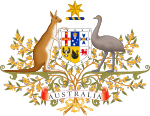Australian nationalism
Politics of Australia |
|---|
 |
|

| Part of a series on |
| Nationalism |
|---|
|
| Part of a series on |
| Far-right politics in Australia |
|---|
 |
|
Australian nationalism asserts that the Australians are a nation and promotes the national and cultural unity of Australia.[1][2][3][4] Australian nationalism has a history dating back to the late 19th century as Australia gradually developed a distinct culture and identity from that of Britain, beginning to view itself as a unique and separate entity and not simply an extension or a derivation of British culture and identity.[citation needed]
History[]
Pre-Federation[]
By the early 19th century, Australia was governed by the British Empire as a series of six largely self-governing colonies that were spread across the continent.[5] Attempts to coordinate governance had failed in the 1860s due to a lack of popular support and lack of interest from the British government, but by the 1880s, and with the rise of nationalist movements in Europe, the efforts to establish a federation of the Australian colonies began to gather momentum. The British government supported federation as a means to cement British influence in the South Pacific.[6]
Nationalistic sentiments increased as a result of Australia's participation in the First and Second World Wars, with concepts such as "mateship" becoming a cornerstone of Australian nationalism.[7]
Australian nationalist parties[]
Current[]
- Australia First Party
- Australian Protectionist Party
- Katter's Australian Party
- Love Australia or Leave
- Pauline Hanson's One Nation
- The Great Australian Party
Defunct[]
- Advance Australia Party
- Australian Nationalist Party
- Centre Party
- Fraser Anning's Conservative National Party
- Nationalist Party
- Reclaim Australia: Reduce Immigration
- Rise Up Australia Party
Australian nationalist movements and groups[]
Active[]
- Antipodean Resistance
- Australian League of Rights
- True Blue Crew
- Lads Society
Defunct[]
- Australia First Movement
- Australian Natives' Association
- New Guard
- United Patriots' Front
Prominent Australian Nationalists[]
Historical[]
- Henry Lawson
- Banjo Patterson
- Jack Lang
- Percy Stephenson
- Alexander Rud Mills
- William Lane
- Norman Lindsay
- Frank Anstey
- Ian Mudie
- Rex Ingamells
- William Baylebridge
Contemporary[]
- Pauline Hanson
- Jim Saleam
See also[]
- Ultranationalism
- Neo-fascism
- White Australia policy
- Australian patriotism
- Reclaim Australia
- Xenophobia
- Indigenous Australians
References[]
- ^ wiliam, Sydney Australia. "Nationalism in Australia". Retrieved 11 March 2016.
- ^ Christopher Scanlon (25 January 2014). "Australia Day: is nationalism really so bad?". The Conversation. Retrieved 11 March 2016.
- ^ "Surrendering nationalism". Griffith Review. Retrieved 11 March 2016.
- ^ "Nationalism and racism". Retrieved 11 March 2016.
- ^ Crisp, Leslie (1949). The Parliamentary Government of the Commonwealth of Australia. Adelaide: Longmans, Green & Co. Lotd. pp. 2.
- ^ Trainor, Luke (1 January 1994). British Imperialism and Australian Nationalism: Manipulation, Conflict and Compromise in the Late Nineteenth Century. Cambridge University Press. pp. 3–4. ISBN 9780521436045.
- ^ Trainor, Luke (1 January 1994). British Imperialism and Australian Nationalism: Manipulation, Conflict and Compromise in the Late Nineteenth Century. Cambridge University Press. p. 4. ISBN 9780521436045.
- Australian nationalism
- Australian culture
- Political terminology in Australia
- Far-right politics in Australia
